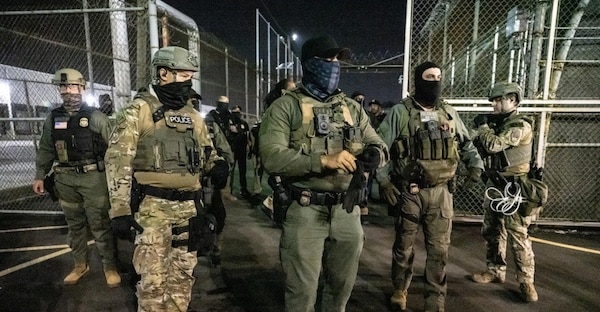
Salon (7/3/25): “The funds going towards deportation would…be enough to fully fund the program to end world hunger for four years.”
And so it has come to pass: U.S. President Donald Trump’s “big, beautiful bill” has set the stage for tax cuts for the rich, slashed services for the poor, and a host of other things that qualify as “beautiful” in the present dystopia. Some cuts, like those to Medicaid, have been heavily covered by the corporate media. But one key piece of the bill has gotten much less media scrutiny: The preposterous sum of $175 billion has been allocated to fund Trump’s signature mass deportation campaign, which, as a Salon article (7/3/25) points out, exceeds the military budget for every single country in the world aside from the U.S. and China.
Approximately $30 billion of that is destined directly for U.S. Immigration and Customs Enforcement (ICE), the goons who have recently made a name for themselves by going around in masks and kidnapping people. This constitutes a threefold increase over ICE’s previous budget, and propels the outfit to the position of the largest U.S. federal law enforcement agency in history. $45 billion will go toward building new ICE detention centers, including family detention centers.
Prior to the signing into law of the sweeping bill on July 4, U.S. Vice President JD Vance took to X to highlight what really mattered in the legislation:
Everything else—the CBO [Congressional Budget Office] score, the proper baseline, the minutiae of the Medicaid policy—is immaterial compared to the ICE money and immigration enforcement provisions.
Scant attention to ICE expansion

“What happens if we spend more than the military budget of Russia on deportation?” was not a question the New York Times (7/3/25) thought needed answering.
And yet many U.S. corporate media outlets have paid scant attention to this aspect of the bill and refrained from delving too deeply into the matter of what exactly this massive ramping up of ICE portends for American society. According to a search of the Nexis news database, while half (50%) of newspaper articles and news transcripts mentioning the reconciliation bill from its first passage in the House (May 20) to its signing into law (July 4) also mentioned Medicaid, less than 6% named Immigration and Customs Enforcement or ICE.
Even many of those that did mention ICE barely gave it any attention. On July 3, for example, the New York Times presented readers with “Nine Questions About the Republican Megabill, Answered,” which in response to the first question—“Why is it being called a megabill?”—did manage to mention “a 150% boost to the Immigration and Customs Enforcement budget over the next five years.” However, there was no further discussion in the article’s remaining 1,500-plus words of potential ramifications of this boost—although there was a section devoted to the “tax break for Native Alaskan subsistence whaling captains.”
That was more than CNN’s intervention managed, also published on July 3, and headlined “Here’s Who Stands to Gain From the ‘Big, Beautiful Bill.’ And Who May Struggle.” The article aced a couple of no-brainers, including that “corporate America” would be “better off” thanks to the bill, while “low-income Americans” would be “worse off.” But there was not a single reference to the ICE budget—or who might “struggle” because of it.
‘Detention blitz’
This is not to imply, of course, that there are no articles detailing what ICE has been up to in terms of persecuting refuge seekers, visa holders, legal U.S. residents and even US citizens—who supposedly have greater protections under the law—and how all of this stands to get worse, in accordance with the impending deluge of anti-immigration funds.
In its report on ICE’s looming “detention blitz,” the Washington Post (7/4/25) noted that “at least 10 immigrants died while in ICE’s custody during the first half of this year,” and cited the finding that ICE is “now arresting people with no criminal charges at a higher rate than people charged with crimes.”
The Post article also contained sufficiently thought-provoking details to enable the conscientious reader to draw their own conclusions regarding the ultimate purpose of manic detention schemes. (Hint: it’s not to keep America “safe.”) For instance, we learn that the share prices of GEO Group and CoreCivic—the two largest detention companies contracted by ICE, which have notorious reputations for detainee mistreatment—“each rose about 3%… as investors cheered the passage of congressional funding likely to result in a flurry of new contracts.”

Washington Post (7/4/25): “Immigrant rights advocates are imploring the government not to award more contracts to…companies they say have failed to provide safe accommodations and adequate medical care to detainees.”
Lest there remain any doubt as to the centrality of profit flows to the immigration crackdown, the article specifies that GEO Group and CoreCivic “each gave $500,000 to President Donald Trump’s inauguration, according to Federal Election Commission data.”
This article, however, came after the legislation was passed.
A Post opinion piece (6/30/25), meanwhile, put a human face on some of ICE’s victims, such as Jermaine Thomas, born to a U.S. soldier on a military base in Germany. Following an incident of “suspected trespassing” in Texas, Thomas was deported by ICE to Jamaica, a country he had never set foot in. Other victims spotlighted by the Post include 64-year-old Iranian immigrant Madonna Kashanian, nabbed while gardening at her house in New Orleans, and a six-year-old Honduran boy with leukemia who was arrested at an immigration court in California while pursuing his asylum case with his family.
It was also possible, if one sought it out, to find reporting on what the cash infusion entails from a logistical perspective: more agents, more arrests, more racial profiling, increased detention capacity, and a deportation system that runs “like Amazon, trying to get your product delivered in 24 hours,” as ICE’s acting director Todd Lyons charmingly put it.
‘Police state first’
Gutting Medicaid is certainly an angle on the reconciliation bill that deserved the media attention it got, and will devastate millions in this country. But the massive infusion of money and power to ICE will likewise devastate millions with a ballooning police state that unleashes terror, rips apart families and creates a network of concentration camps across the country. Given ICE’s contemporary track record and de facto exemption from the constraints of due process, the public desperately needs a media that will connect the dots in order to convey a bigger-picture look of what America is up against.
In an interview with Jacobin magazine (7/3/25) on how “ICE Is About to Get More Money Than It Can Spend,” Aaron Reichlin-Melnick—a senior fellow at the American Immigration Council—made the crucial observation: “You don’t build the mass deportation machine without building the police state first.”
This is precisely the analysis that is missing from corporate media coverage of the bill. Beyond making life hell for the undocumented workers on whose very labor the U.S. economy depends, ICE has become a tool for political repression as well—as evidenced by a slew of recent episodes involving the abduction and disappearance of international scholars whose political opinions did not coincide with those of the commander in chief of our, um, democracy.

Supreme Court Justice Sonia Sotomayor (NPR, 4/15/25): The Trump administration believes it “could deport and incarcerate any person, including U.S. citizens, without legal consequence, so long as it does so before a court can intervene.”
Take the case of 30-year-old Rümeysa Öztürk, a Turkish doctoral student and Fulbright scholar studying childhood development at Tufts University in Massachusetts. While walking to an iftar dinner in March, Öztürk was accosted by six plainclothes officers, some of them masked, and forced into an unmarked van, after which she was flown halfway across the country to an ICE detention center in Louisiana. Her crime, apparently, was to have co-written an opinion piece last year for the Tufts Daily (3/26/24), in which she and her co-authors encouraged the university to accede to demands by the Tufts Community Union Senate by recognizing the Israeli genocide in the Gaza Strip and divesting from companies with ties to Israel.
Öztürk’s case is hardly an isolated one. There’s Badar Khan Suri, a postdoctoral researcher at Georgetown University who was seized by masked agents outside his Virginia home and swept off to an ICE facility in Texas. There’s Momodou Taal, a British-Gambian former PhD student at Cornell who sued the Trump administration over the crackdown on Palestine solidarity and then self-deported, explaining that he had “lost faith [he] could walk the streets without being abducted.” And the list goes on (Al Jazeera, 5/15/25).
‘Homegrowns are next’
In the twisted view of the U.S. government, of course, opposing the U.S.-backed genocide of Palestinians equals support for “terrorism”—and in Trump’s view, basically anything that goes against his own thinking and policies potentially constitutes a criminal offense. It follows that Öztürk-style politically motivated kidnappings by the state are presumably merely the top of a very slippery slope that U.S. citizens, too, will soon find themselves careening down—especially as Trump has already exhibited enthusiasm at the prospect of outsourcing the incarceration of U.S. citizens to El Salvador: “The homegrowns are next,” he told Salvadoran autocrat Nayib Bukele.
The line between citizens and residents has been intentionally blurred, with the Trump Justice Department announcing it was “Prioritizing Denaturalization”—that is, stripping citizenship from foreign-born citizens. This draconian punishment has been proposed for Trump’s political enemies, from New York mayoral candidate Zohran Mamdani to former BFF Elon Musk. Trump has also taken aim at the constitutional right of birthright citizenship, potentially turning millions of other Americans into ICE targets.
Somehow, the elite media have not deemed it necessary to dwell even superficially on the implications of super-funding a rogue agency that has essentially been given carte blanche to indiscriminately round people up—be they undocumented workers, political dissidents, or just somebody who “looks like somebody we are looking for.” As for CNN’s write-up on “who stands to gain from the ‘big, beautiful bill,’” it’s definitely not all the folks currently living in a permanent state of fear, deprived of basic freedoms like movement, speech and thought
Belén Fernández is the author of The Darién Gap:A Reporter’s Journey through the Deadly Crossroads of the Americas and Inside Siglo XXI: Locked Up in Mexico’s Largest Immigration Center, among other titles. She is an opinion columnist at Al Jazeera.

